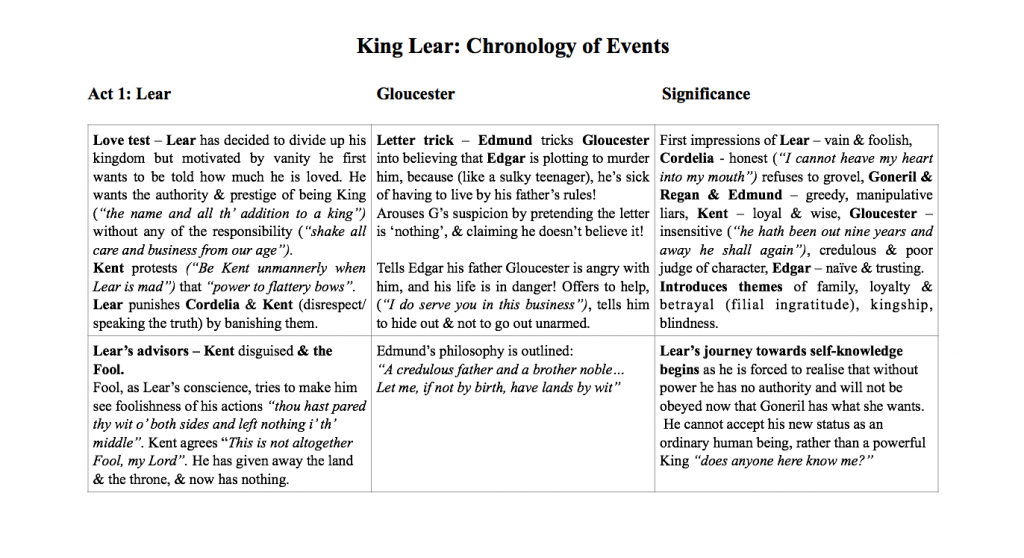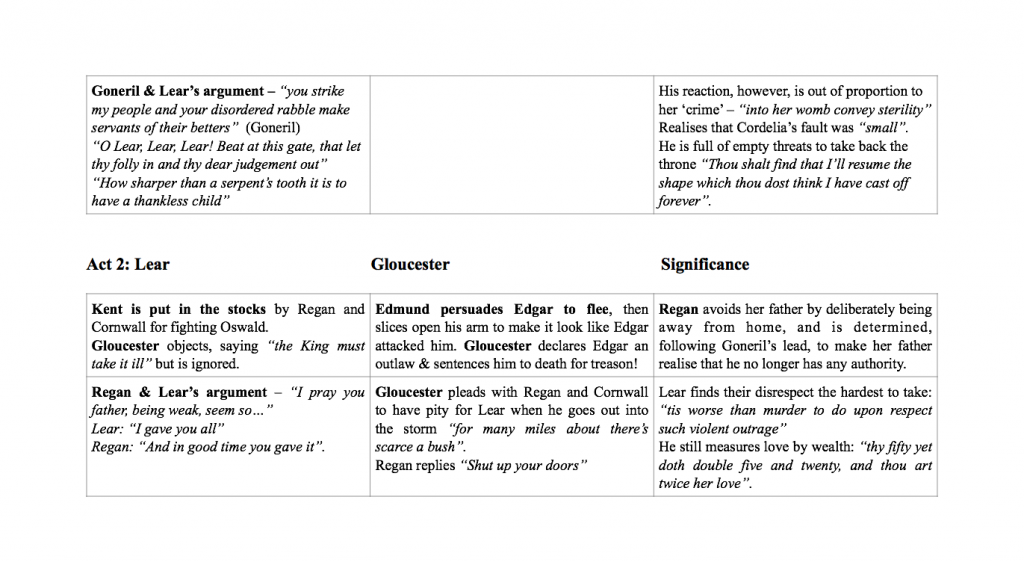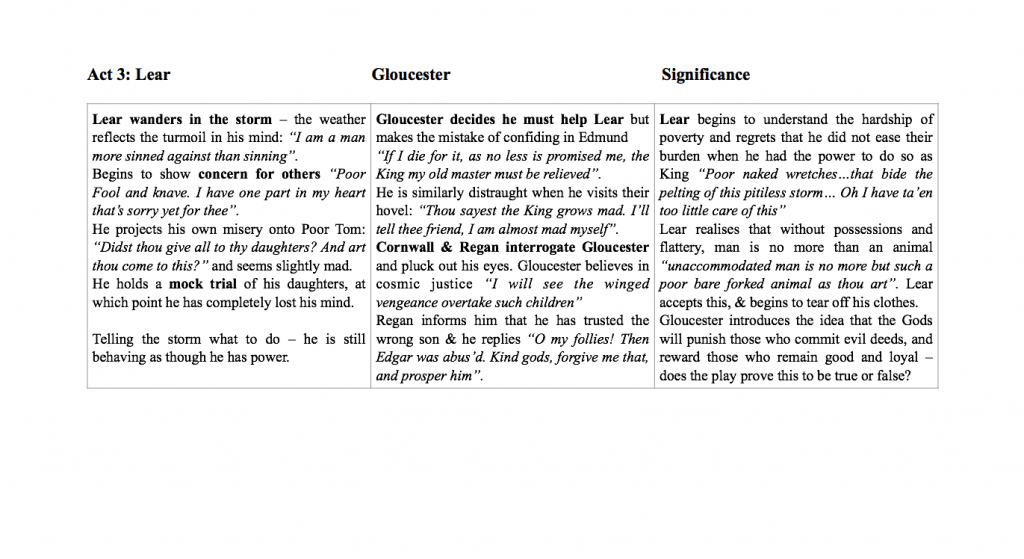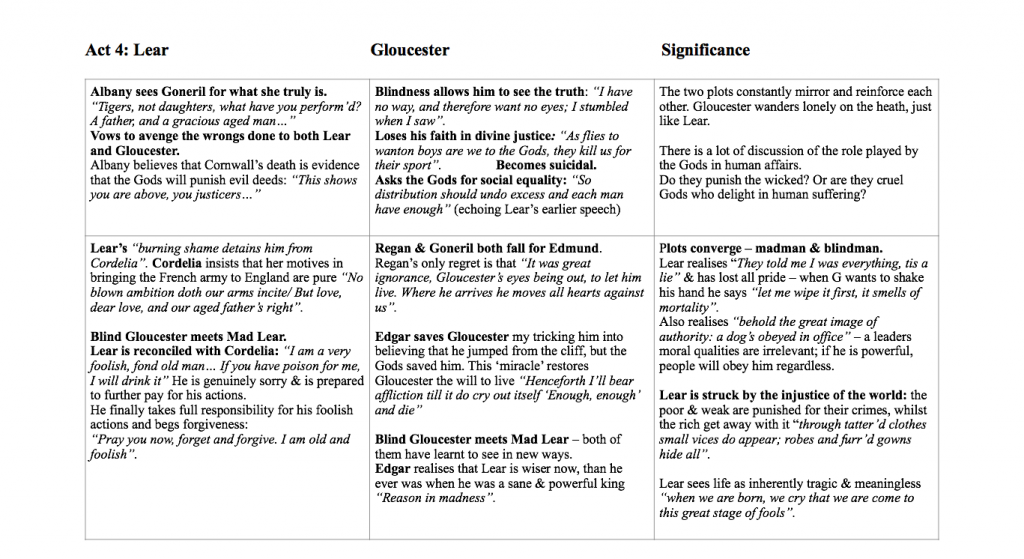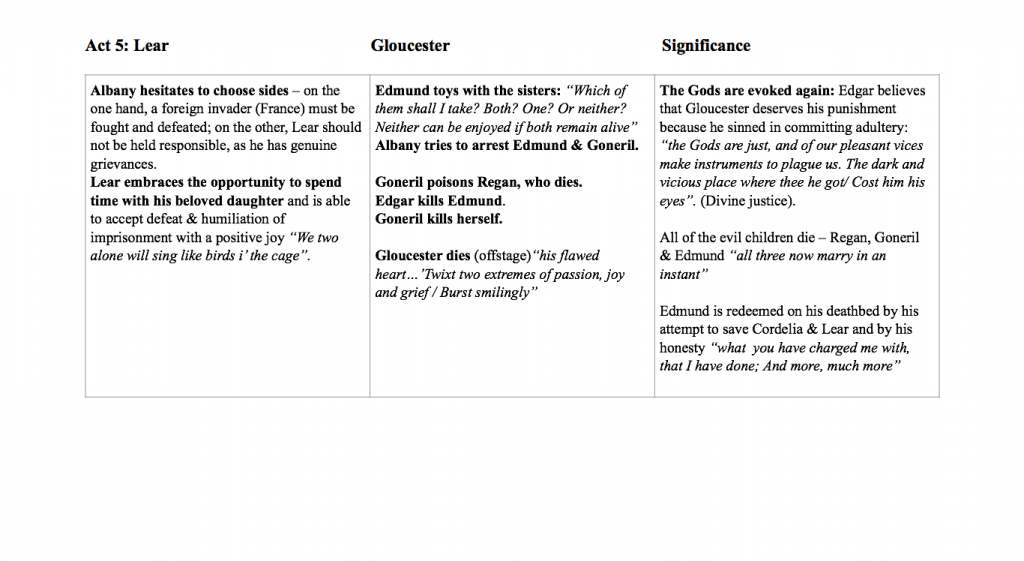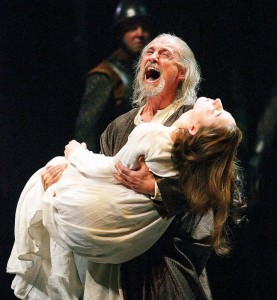Lear’s journey?
Sample question: “In the play, King Lear moves from a position of centrality to one of loneliness and isolation” – Discuss.
Here are somes notes and ideas – you’ll note this is NOT A COHERENT ESSAY – it’s just some ideas that would need to be formulated into coherent paragraphs before it would constitute anything even vaguely resembling a coherent essay.
Sample intro:
The play King Lear centres around its protagonist’s movement from a king used to total dominance, to a frail man. Lear does indeed move from a position of centrality to one of loneliness and isolation yet ultimately he moves beyond his isolation back to a position of some power.
Some ideas:
Lear asserts his control through threatening language at the beginning “mend your speech a little, lest you may mar your fortunes”. When he faces opposition, he will not tolerate it, and flies into a rage.
Despite his actions, Cordelia and Kent remain loyal to him.
Once his other daughters begin to mistreat him, his state of mind illustrates how lonely he feels “does any here know me? This is not Lear” He is but a shadow of his former self.
The stocks act as a symbol of his powerlessness. He has nothing and is nothing without his kingship. Beginning to realise this when he sees how his messenger is treated. He goes out into the storm proclaiming “fool I shall go mad”. The storm symbolises the tempest in his mind. “a poor infirm weak and despised old man”.
Lear’s isolation may be a result of not coming to terms with what he had done “I am a man more sinned against than sinning”. Loses his sanity & in the mock trial, begins to imagine that even his own dogs are barking at him.
Reconciliation scene with Cordelia marks the end of his isolation. Lear recognises his own faults “I am a very foolish fond old man”. By the end, he just wants to be a father and spend time with his daughter.
LEAR’S JOURNEY:
He starts off at the top of the wheel of fortune.
He is King. He is surrounded by seemingly loyal servants and seemingly loving daughters. Sitting on a throne, he is King and ultimate ruler.
He gives it away, and so begins his slow yet interminable descent.
Losing status all the way down – he gives away his land, he gives away his power, he loses his daughters one by one, he loses his retinue, his knights are taken away from him until the point of “what need one?”, he begins to lose his sanity,
Realisation that he is no better than the poor naked wretch that Tom is.
As he moves towards madness, he achieves valuable insights – he sees the corruption, the falsity and the flattery that he couldn’t see when he was in power “a dog’s obeyed in office”. He sees the huge inequalities in society and develops an empathy and understanding for others. When he strips himself of clothes he leaves behind his pride and former life. He is now at the level of the poorest of his subjects.
Almost at rock bottom. Descent into madness – mock trial.
Himself, a fool, a madman, and one loyal friend in disguise.
What does Lear lose?
LAND
POWER
DAUGHTERS
RETINUE/KNIGHTS
SHELTER
SANITY
Is Lear completely responsible for what happens to him? Or can we blame other factors too?
Is the character of Lear more sinned against than sinning?
Look at it from both sides of the fence, but take a firm stance.
SINS =
1. Irresponsibility – divinely appointed King resigning his position because he’s tired of the responsibility that comes with it. Also, the idea of splitting up his Kingdom without due thought or consideration of the implications of this decision?
Needs a strong unified leadership. Fair game for an invading force or infighting.
2. Vanity and love of flattery – love test. Easily deceived when he’s told what he wants to hear. Cannot see the wisdom & truth of Cordelia’s statement because he is so accustomed to fawning yes men.
3. Anger – he reacts impetuously, rashly. He is vengeful and has no understanding of the potential repercussions of his actions. Curses Cordelia and Kent and banishes them.
4. Blindness – blind to the fact that all of his powers have now been reduced to nothing. Has unwittingly created a new position for himself but cannot see it.
Points we can make in his defence? =
1. Was once a good king – he is also old. Upward of four-score years. Reasonable to presume that if he wasn’t deposed or murdered during this long reign he must have once been a good king who was well liked by his subjects. Cordelia and Kent remain loyal – they can obviously see something in him worth defending. Same is true of Gloucester, and eventually Albany.
2. His daughters exploit and torment him – his daughters are deliberately trying to force him to admit that he is now subject to their rules and authority. The fool doesn’t soften the blow for Lear either, instead bluntly forcing Lear to acknowledge his own foolishness and powerlessness.
3. Learns from his mistakes (too late) – the more he learns of his mistakes, the more cruelly he is treated. Does he deserve the extent of the punishment meted out to him?
4. The storm scene/enlightenment – storm can be seen as a response by nature to the wrongs that he is suffering. Deepest sympathies lie with the aged King at this point. Begins to see clearly… “expose thyself to feel what wretches feel”
5. Loss of Cordelia – he has come full circle, and has overcome his anger, vanity, blindness and pride only to lose the one person who has remained loyal and true to the very end. His heart is broken. He has nothing left to live for.
6. Transformation @ end – he has now become a King and a man whom we can admire. Frail man who is more sinned against than sinning.
Greatest mistake = desire to rest his weary bones as he is old AND errors of judgement that come from being in a position of authority for too long. Mistakes he makes in going about his retirement were deeply flawed, but his punishments are certainly disproportionate to the crimes he committed.

